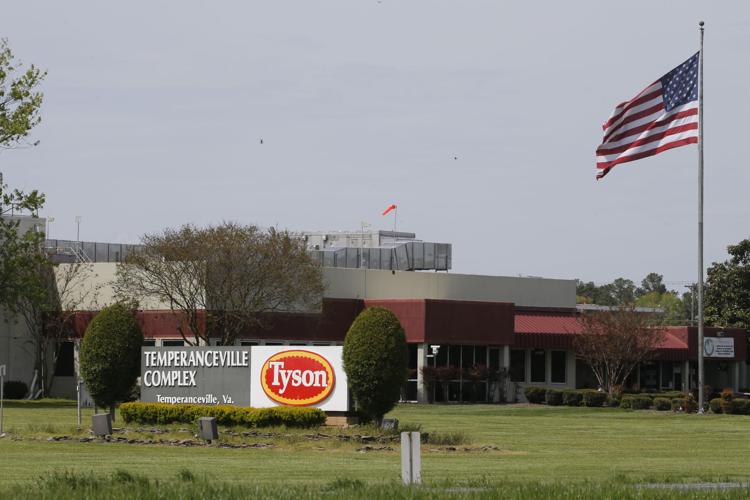Virginia’s new COVID-19 workplace regulations approved without input from businesses

An American flag flies outside the Tyson Foods Temperanceville Complex on Wednesday, April 29, 2020, in Temperanceville, Va.
(The Center Square) – Business advocates criticized the Virginia Department of Labor and Industry on Wednesday after its Health Codes Board voted to adopt sweeping regulations to curb the spread of COVID-19 without considering many of the concerns from business associations.
With Wednesday’s vote, Virginia became the first state to adopt temporary COVID-19 workplace safety and health standards, which include regulations on sanitization, social distancing, face coverings, training, record keeping and more.
The Virginia Business Coalition, which is made up of 27 business associations, opposed the regulations, which they claim were too broad and far-reaching.
The Health Codes Board accepted written comments but did not allow any oral testimony through virtual means during discussions. Nicole Riley, the Virginia state director for the National Federation of Independent Business, said very few of the business community’s objections were even considered by the board.
“Gov. [Ralph] Northam ignored almost every suggestion we gave to make this proposal more palpable for small business by having his agency chiefs push through a labor-backed amendment at the last moment that raises business costs and adds regulatory burdens at the worst possible time,” Riley said in a statement. “With this vote, Virginia’s repeated ranking as a top state for business has evaporated, we won’t be able to compete with other states and our economic recovery will be put in low gear.”
The new regulations mandate all employers to require face coverings to be worn by employees when social distancing cannot be met and when an employee is in a position in which he or she faces a customer. Employers also will need to mandate social distancing measures whenever possible. Employers will need to provide frequent hand washing or hand sanitizer and regularly clean high-contact surfaces.
Businesses will be required to provide training to employees to follow state guidance that is not yet publicly available. Employers also will need to maintain records that demonstrate compliance in case a complaint is launched against them.
Employers must notify employees within 24 hours if a coworker tests positive for COVID-19, and employees who have or are suspected to have COVID-19 cannot come to work for 10 days unless they receive two consecutive negative tests.
The full body of regulations has not been published or provided to the public for business associations and lawyers to review, although the specifics were discussed during the board meetings.
In a phone interview with The Center Square, Riley said the new regulations take away a lot of flexibility businesses have right now. If a business was complying with previous standards and training their employees, she said they might have to change their policies and provide new training.
Riley said mandatory face masks could be dangerous for certain occupations, such as ones with a lot of machinery. She also said small businesses who don’t have compliance officers on staff could struggle to comply with every regulation, and she’s worried agencies will “come in with a hammer” after Northam said earlier this week he will bolster enforcement.
“The business community’s comments on the Northam Administration’s ‘one-size-fits-all’ COVID-19 safety standards and regulatory process were largely ignored, ” Brett Vassey, the president and CEO of the Virginia Manufacturers Association, said in a statement. “Barring public comments at the Health & Safety Board hearings over the last three weeks limited the Board’s understanding of existing controls that Virginia employers have already employed to protect workers despite the now 60-plus-page set of new regulations and training mandates that will be imposed upon all employers.”
Jodi Roth, the director of government affairs at the Virginia Retail Federation, expressed similar concerns.
“Perhaps some will feel pleased Virginia is the first to impose a statewide pandemic workplace mandate promoted by labor groups, but ignoring the harm it will cause the state’s businesses is shortsighted,” Roth said. “It sends a message to Virginia businesses that the state doesn’t value their contributions and isn’t listening to their concerns, and it will discourage out-of-state businesses from ever moving here.”
Northam defended the regulations in a statement, arguing Virginians should not have to risk their health and safety to earn a living. He said these standards are needed to maintain safety for workers, and they are necessary for the state’s economic recovery.
Virginia Secretary of Commerce and Trade Brian Ball said in a statement the regulations will provide a safer and more predictable workplace for Virginians, which is critical for a sustained economic recovery.
The regulations also had support from union groups.
“This is an important first step towards the protection of workers during this public health crisis, and we urge the members of the committee to continue to pass meaningful and positive standards that will promote job safety, protect workers, and protect our community,” Virginia AFL-CIO President Doris Crouse-Mays said in a statement.
The new regulations will be in effect for at least six months, but can be made permanent through a process defined in state law.

